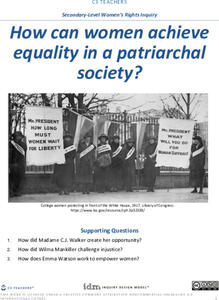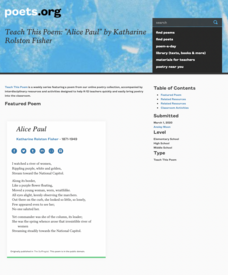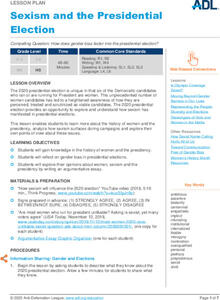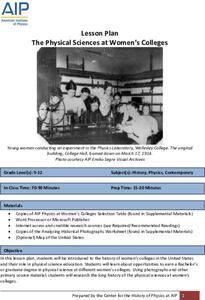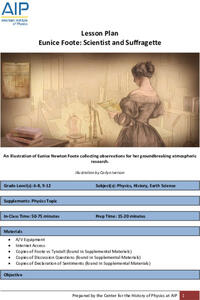Curated OER
Abigail and Her Sisters
The 10th lesson in this series has researchers examining a packet of letters from Abigail Adams to her sisters. Scholars note examples of the themes that appear throughout the letters.
Curated OER
Abigail at Seventeen
Young historians analyze a letter 17-year-old Abigail Adams wrote to her cousin and identify the aphorism Adams used. Participants select a line from the letter and create an illustration of the aphorism.
Curated OER
Abigail in Mourning
People deal with grief in different ways. The series of Abigail Adams' letters in this lesson reveals how she dealt with losing her mother, father, and community members. The included worksheet helps young scholars identify the tone and...
Curated OER
Abigail as Feminist
Young historians examine a 1778 letter from Abigail Adams to John Thaxter and another from Abigail to her husband John Adams, written in 1776, that reveal her views on the perceived role of women and the laws that governed women's roles....
Curated OER
Abigail and John in Love
The second instructional activity in the series asks groups to analyze an exchange of love letters between Abigail and John Adams. Scholars identify the many allusions and references in the letters and consider what they can infer about...
Curated OER
Introduction to Abigail Adams
Remember this lady! Abigail Adams, the wife of John Adams, the second President of the United States, and the mother of the sixth president, John Quincy Adams, was much more than a wife and mother. This prolific letter writer is the...
C3 Teachers
Women’s Rights: How Can Women Achieve Equality in a Patriarchal Society?
Women today may not have heard of Madame C.J. Walker or Wilma Mankiller, and a few may not be aware of Emma Watson's current role; however, they have certainly benefited from their efforts. Using questions supplied by this guided...
C3 Teachers
Call for Change: What Did It Take for Women to Be Considered “Equal” to Men in New York?
An inquiry-based lesson challenges fourth graders to examine who had voting rights in New York when it was founded, women's roles, and how they entered politics. Scholars participate in thoughtful discussions and show what they know...
Anti-Defamation League
7 Ideas for Teaching Women's History Month
Celebrate Women's History Month with hands on-learning. The resource provides seven strategies to help educators teach Women's History Month, ranging from watching films to reading books written by women. Activities including writing...
National First Ladies' Library
Women's Lives in the Victorian Era
The lives of middle-class Victorian women were circumscribed by strict standards that governed all aspects of behavior. To gain a better understanding of the Victorian Ideals for women, class members research the life of a middle-class...
Academy of American Poets
Teach This Poem: "When Fannie Lou Hamer Said" by Mahogany L. Browne
After watching an excerpt from a video of Fannie Lou Hamer's testimony before Congress, pupils do a close reading of Mahogany L. Browne's poem "When Fannie Lou Hamer Said," annotate words and phrases that draw their attention and list...
Academy of American Poets
Teach This Poem: "Alice Paul" by Katharine Rolston Fisher
Powerful women need not look like Wonder Woman. After writing a paragraph about a strong woman they know, young scholars examine images of Alice Paul and then do a close reading of Katharine Rolston Fisher's poem "Alice Paul." Finally,...
Smithsonian Institution
The Suffragist: Educator's Guide for Classroom Video
Class members take on the role of historical investigators to determine why it took 40 years for women in the United States to get the right to vote. Sleuths view videos and analyze primary sources and images to gather evidence to answer...
National Endowment for the Humanities
Harriet Tubman and the Underground Railroad
While many have heard of Harriet Tubman, few are aware of the many ways this remarkable woman was involved in the United States Civil War, the abolitionist movement, and the Underground Railroad. Young historians examine primary source...
National Endowment for the Humanities
Toni Morrison's Beloved: For Sixty Million and More
Complex, disturbing, and challenging, Beloved is the focus of a lesson that provides three activities to guide a close reading of Toni Morrison's novel. Readers create chapter titles based on key plot elements or themes, identify...
Learning for Justice
Mary McLeod Bethune
Young historians conduct a close reading of the text of an interview with Mary McLeod Bethune, the daughter of former slaves who taught herself to read, grew up to establish schools for other Black women, and went on to become an advisor...
Anti-Defamation League
Sexism and the Presidential Election
Young historians investigate how sexism impacted the 2020 United States presidential election. They examine media coverage of the six women candidates, engage in a four-corners debate reacting to statements about gender and the...
Anti-Defamation League
Soccer, Salaries and Sexism
Call it soccer, call it football, but call it unfair! the US women's soccer team has called out the US Soccer Federation for unfair treatment in terms of salaries, support, and working conditions in a lawsuit filed in 2019. Young...
Learning for Justice
Maya Angelou
Maya Angelou's poem, "Still I Rise", offers young scholars an opportunity to consider how poets use literary devices to create powerful messages. After a close reading and discussion of the poem, class members reflect on how they can...
Teaching Women's History
Georgian Women
Britain was and is a stratified nation. History sleuths investigate the Georgian Era (1714-1830) of British history to gain an understanding of how the roles women played during this period were influenced by class, race, and religion....
US National Archives
Susan B. Anthony and the Struggle for Suffrage
Susan B. Anthony was willing to break the law to gain voting rights for women. Young historians investigate Anthony's willingness to go to jail to draw attention to the suffrage movement. They read and discuss primary source documents to...
Teaching Women's History
Medieval Women
Not all the women in the late Middle Ages (1400-1510) lived lives of quiet desperation. Young historians study images and read primary source documents to gain an understanding of what life was like for the elite class of medieval women.
American Institute of Physics
The Physical Sciences at Women's Colleges
After a brief introduction to the history of women's colleges in the United States and a discussion of the resistance such institutions faced, young scientists investigate seven traditionally women's colleges and their physics programs....
American Institute of Physics
Eunice Foote: Scientist and Suffragette
The greenhouse effect and climate change are hot topics in today's news. Young scientists may be surprised to learn that the concept is not a new one. In fact, Eunice Newton Foote, scientist, inventor, and suffragette, discovered the...








